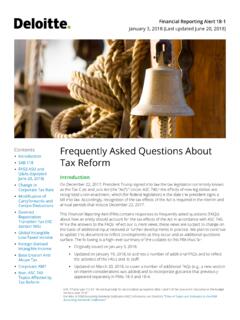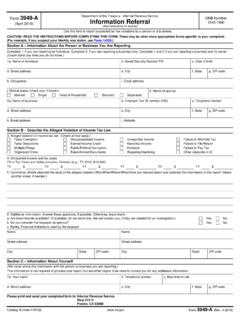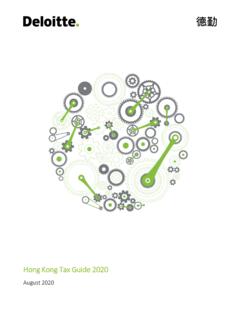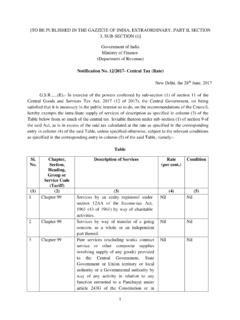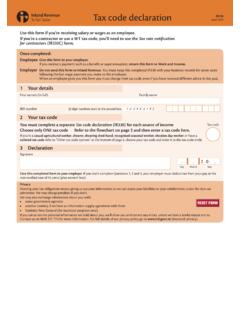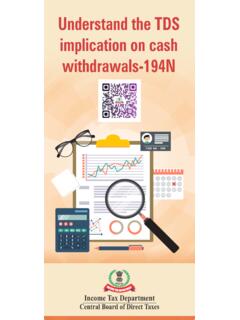Transcription of In tax Indian regulations for expatriates working in India
1 For private circulation onlyDecember regulations for expatriates working in IndiaReady for all your queriesContents1. India taxes - What you need to know 42. India taxes - What the employer needs to know 63. Social security obligations in India 74. Other regulations 92In recent times, the Indian government has increased its attention towards the expatriate population. This has translated into changes in various legislations and resulted in increased responsibilities and additional compliance requirements. Given this scenario this update was created to provide a better understanding of the tax, immigration, social security and other allied laws which are relevant for the expatriate Assignee s stay in India is the key driver for determining his/her tax residency in IndiaIndian regulations for expatriates working in India Ready for all your queries 3 Tax residencyThe Indian fiscal year runs from 1 April to 31 March.
2 An assignee is liable to pay taxes in India based on his/her tax residency during a fiscal year. Tax residency is dependent on the stay of the assignee in India , irrespective of the purpose of such stay. An assignee can be a Resident and Ordinarily Resident (ROR), Resident but not Ordinarily Resident (RNOR) or Non-Resident (NR) in a year. If you arrive in India for the first time, you will be NR/RNOR for the first two fiscal years. Generally, a person who spends more than 181 days in India during a fiscal year and more than 729 days in India in the previous 7 years will be an ROR for that fiscal year. The tax residency of an individual will determine the scope of income liable to be taxed in India . Scope of Income Source of IncomeRORRNOR/NRReceived in IndiaTaxableTaxableSourced in IndiaTaxableTaxableSourced and received outside IndiaTaxableTaxableTax registration numberAn assignee who is liable to pay taxes in India must apply for a tax registration number Permanent Account Number (PAN) with the Indian Income Tax Authorities in Form 49AA / Form 49A as applicable together with the prescribed documents.
3 PAN is generally allotted within 15 days of submitting prescribed documents. The PAN is to be applied for immediately on arrival since it is required for foreigners registration with the Foreigners Regional Registration Office (FRRO).Individual tax rates India follows progressive rates of taxation for individuals. The applicable tax rates for fiscal year 2013-14 (1 April 2013 to 31 March 2014) are as below:* exemption limit for senior citizens of age 60 years or more is `250,000 and super senior citizens of age 80 years or more is `500,000. **Rebate of up to `2,000 available if the total income does not exceed `500, taxes:Surcharge at the rate of 10% is payable on tax if income exceeds `10 million (only for fiscal year 2013-14).
4 Educational cess at the rate of 3% is payable on tax plus surchargeTax paymentTaxes on income earned will be payable through the following mechanisms. India taxes What you need to know Withholding tax (TDS) Estimation of total income Monthly deduction and remittance of taxes Advance tax Trigger only if tax exceeds 10,000. Determination of tax on estimated personal income Payment of tax in installments due by 15th of September/December and March of every fiscal year Self-assessment tax Determination of tax on actual income Payment of tax on or before filing return of incomeIncome Slab (`)Rate %Upto 2,00,000*Nil200,001 - 500,000**10500,001 1,000,000201,000,001 or above304 Tax return The due date for filing the India tax return is 31 July following the end of every fiscal year.
5 The return can be filed either manually or electronically. However, electronic filing is mandatory in cases where the taxable income exceeds `500,000. There is no system of joint filing of tax return with spouse. The return may be subjected to scrutiny by revenue authorities. An assignee who qualifies as ROR in a fiscal year has to report moveable and immoveable assets held overseas along with any financial interest or signing authority abroad and trusteeship in offshore trusts in the India tax return. This requirement is independent of the assignee having taxable income for the fiscal Tax Clearance Certificate (ITCC)An assignee who is repatriating back to home country should obtain an ITCC No Objection Certificate from the Income Tax Authorities.
6 This certificate is required to be presented to the immigration authorities at the time of departure from India . Taxation principlesSalary incomeRemuneration earned by an individual for services rendered in India during the assignment period is taxable in India (irrespective of where the payment has been received). This will include salary for any holiday period during the assignment. In addition, any sum that is relatable to the India service period and received preceding/succeeding the assignment period will also form part of salary income. Perquisites/fringe benefits such as accommodation, car, employee stock option, education benefits provided by the employer are also liable to tax. Some of the allowances/benefits like housing and leave travel are eligible for specific deductions/exemptions subject to the amount being actually expended and satisfaction of requisite conditions.
7 Further, certain investments made during the year are eligible for deduction from total income up to `100,000, subject to the satisfaction of specified conditions. OthersDouble Taxation Avoidance Agreements (DTAA) India has entered into 94 double taxation avoidance agreements and 10 Tax information exchange individual who is resident of a country with which India has entered into DTAA could avail the treaty benefits to either eliminate taxation in one of the countries or avail credit of taxes paid in the country of residence. Commencing from India fiscal year 2012-13, assignees would require a tax residency certificate (TRC) from the tax authorities of the resident country to avail treaty benefits in the India tax return.
8 In addition, prescribed details are to be submitted in Form 10F if not already mentioned in the rendering services in India for a shorter span may be eligible to claim short stay exemption under the Indian Income tax Act, 1961 or the relevant DTAA provided certain conditions are satisfied. Indian regulations for expatriates working in India Ready for all your queries 5 India taxes What the employer needs to knowPermanent Establishment (PE) Exposure Deputation of assignees to India may lead to a PE of the overseas entity in India if the assignment is not appropriately structured. Accordingly, the profits attributable to the assignees services may be considered taxable in India . India compliances India follows a pay-as-you-earn system of taxation for employment income.
9 An employer is under obligation to withhold taxes and deposit the same with the government treasury. The taxes need to be computed at an average rate and deposited on a monthly basis by the 7th of the succeeding month. An employer also needs to report employee-wise monthly salary and taxes on a quarterly basis in the tax withholding return. A tax deduction certificate needs to be issued annually to the Taxes Code (DTC)It is pertinent to note that the current Income-tax Act is proposed to be replaced by the Direct Taxes Code in the future, though the date from when it would apply is currently uncertain. Key proposals of the DTC Bill (yet to be approved by the Parliament) Education cess is proposed to be dispensed with.
10 Foreign nationals who qualify as resident were not liable to wealth tax on their foreign assets. It is proposed that they are brought within the purview of wealth tax on certain specified foreign assets. Wealth tax is proposed to be levied on wealth exceeding `10 million under DTC regime as against `3 million as per the Wealth Tax Act. Note: DTC proposals have undergone significant changes since the first draft and given that deliberations are still on, there may be further changes before it becomes Income Tax Act proposed to be replaced by the Foreign passport holders working for covered Indian 6 Social security obligations in IndiaForeign nationals International Workers (IWs) working in establishments in India to which Employees Provident Fund (PF) regulations apply are required to contribute to the PF except those who have been specifically exempted under the regulations .






